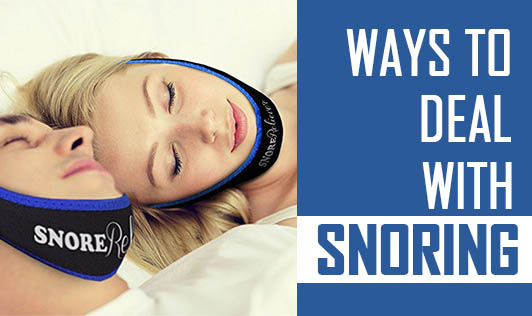Snoring is a common condition in which a person makes a loud, hoarse, or harsh sound while breathing during sleep. It is caused by the vibration of the tissues in the back of the throat, including the soft palate, uvula, and tongue, as air passes through them.
Snoring can range from a soft, barely audible sound to a loud, disruptive noise that can disturb the sleep of the snorer and their bed partner.
Snoring can disrupt both your sleep and the sleep of your partner. Even if it doesn't have a huge impact on you, snoring is a symptom that should not be ignored. Snoring can be an indication of a significant health problem, such as:
- Obesity
- A difficulty with the structure of your mouth, nose, or throat
- Blocked airways
- Sleep deprivation
- Bulky throat tissue
- Alcohol and drug use
- Sleeping position
Lifestyle changes you need to deal with snoring
Sleep on your side
As you sleep on your back, your tongue may move to the back of your throat, partially blocking airflow. Laying on your side may be all that is needed to allow air to move freely and minimize or eliminate snoring.
Treat nasal congestion
Nasal congestion can make it more difficult to breathe through your nose and increase snoring. Treating the congestion with saline nasal sprays or decongestants can help reduce snoring.
Use nasal strips or a nasal dilator
Stick-on nasal strips can be used on the bridge of your nose to help increase nasal passage space. It can improve your breathing and reduce snoring.
Lose weight
If you are overweight, losing weight will help lower the amount of tissue in your throat. Your snoring might be caused by excess tissue.
You can reduce weight by eating smaller portions and more nutrient-dense foods. Try your best to exercise daily.
Limit or avoid alcohol
Avoid drinking alcohol for at least three hours before going to bed. Alcohol might make you snore by allowing the muscles in your throat to relax. Alcohol can also cause sleep problems in other ways.
Get enough sleep
Make sure you receive the 7-9 hours of sleep each night that you need. Your chances of snoring may rise if you lack sleep. It is because it may relax your throat muscles, making you more prone to airway obstruction.
Use a humidifier
Dry air can irritate the tissues in your throat and increase your snoring. A humidifier can improve the air's moisture content and reduce snoring.
Medical treatments for snoring
Continuous positive airway pressure (CPAP) therapy
It involves wearing a mask over the nose or mouth during sleep, which delivers a constant stream of air pressure to keep the airway open.
Oral appliances
These devices are worn in the mouth during sleep and work by positioning the jaw and tongue to keep the airway open.
Surgery
Depending on the severity and cause of snoring, various surgical procedures may be recommended, such as removing the excess tissue from the throat, repairing a deviated septum, or correcting jaw abnormalities.
Consider radiofrequency ablation (RFA)
In this minimally invasive technique, the tissue on your soft palate is reduced using low-intensity radio waves. RFA is referred to as Somnoplasty which is the name of a variation of the operation that has been trademarked.
In a nutshell
Snoring can be a frustrating and disruptive issue. There are several ways to deal with snoring and improve the sleep cycle for everyone involved. From lifestyle changes such as losing weight and avoiding alcohol before bed to using specialized pillows and devices like nasal strips or mouth guards.
It is important to remember that everyone's snoring is unique and what works for one person may not work for another, so it may take some trial and error to find the most effective solution. However, by making some simple changes and seeking medical advice if necessary, it is possible to achieve a more peaceful and restful night's sleep.
